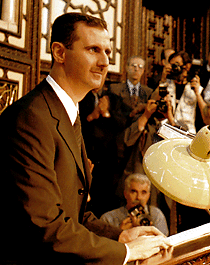The Civil War in Syria Changes Course
Wednesday, July 16th, 2014July 16, 2014

Syrian President Bashar al-Assad (AP/Wide World)
Bashar al-Assad was sworn in today for a third, seven-year term as president of Syria. Speaking at the presidential palace in Damascus, the capital, Assad claimed victory over those who tried and failed to overthrow him in the uprising that began in March 2011. Foreign correspondents attending the ceremony noted that Assad’s words reflect a growing sense that the tide has turned in favor of the government in Syria’s three-year-long civil war. Most major Syrian cities, including Damascus and Homs, are currently secured by government forces, and Assad is presenting himself as the only alternative to fanatical Islamist jihadists. “Assad has been highly successful at the strategy of regime survival at all costs,” a Western diplomat on the scene in Damascus commented to the London Guardian newspaper. “If he can hold on, people may come round to thinking that he is the only feasible partner in the fight against a common enemy” [that is, the jihadist organization known as Islamic State of Iraq and Syria (ISIS)].
Using tanks and artillery seized in Iraq, ISIS insurgents captured much of eastern Syria during the past week, including the oil-rich Deir Ezzor province. The London-based Independent newspaper reported yesterday that ISIS militants are currently battling to break the resistance of Syrian Kurds in the region.
International affairs experts suggest that ISIS military advances in Syria, following victories in Iraq in June, are altering the balance of power in the whole region. Rebels not aligned with either the Syrian government or ISIS are being crushed, leaving Saudi Arabia, Turkey, the United Kingdom, and the United States with no one to back in the Syrian conflict—with the possible exception of Bashar al-Assad himself.
In late June, ISIS declared that it was establishing a caliphate on the territories it controls in Iraq and Syria. The caliphate is to be governed by strict Shari`ah law under the leadership of ISIS leader Abu Bakr al-Baghdadi as caliph. The rebels demanded that all Muslims “pledge allegiance” to the new ruler and “reject democracy and other garbage from the West.”
Additional World Book articles:
- Umayyad caliphate
- Iraq War
- Iraq 2012 (a Back in Time article)
- Iraq 2013 (a Back in Time article)
- Syria 2013 (a Back in Time article)
- Syria: The Roots of a Rebellion (a special report)


